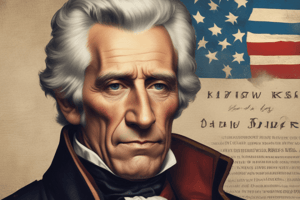Podcast
Questions and Answers
What event catapulted Andrew Jackson into national prominence?
What event catapulted Andrew Jackson into national prominence?
- His opposition to federal tariffs
- His role in the Nullification Crisis
- His military leadership during the War of 1812 (correct)
- His involvement in the 1824 Election
What were the implications of the 1824 Election results for Andrew Jackson?
What were the implications of the 1824 Election results for Andrew Jackson?
- He won the popular vote but not the majority in the Electoral College (correct)
- He won the Electoral College but lost the popular vote
- He won both the popular and Electoral votes
- He lost the popular vote but won the presidency
What helped Andrew Jackson achieve victory in the 1828 Election?
What helped Andrew Jackson achieve victory in the 1828 Election?
- Increased funding for his campaign
- Endorsements from major newspapers
- Support from Southern plantation owners
- Removal of property requirements for voters (correct)
Which statement accurately describes the economic differences between Northern and Southern states during this period?
Which statement accurately describes the economic differences between Northern and Southern states during this period?
What action did Andrew Jackson take during the Bank War?
What action did Andrew Jackson take during the Bank War?
How did South Carolina respond to federal tariffs during the Nullification Crisis?
How did South Carolina respond to federal tariffs during the Nullification Crisis?
What was the outcome of the Supreme Court case Worcester vs. Georgia?
What was the outcome of the Supreme Court case Worcester vs. Georgia?
What challenges did Native Americans face during their relocation process known as the Trail of Tears?
What challenges did Native Americans face during their relocation process known as the Trail of Tears?
Flashcards
Andrew Jackson's Rise to Fame
Andrew Jackson's Rise to Fame
Andrew Jackson rose to national prominence during the War of 1812, particularly for his decisive victory at the Battle of New Orleans in 1815.
Andrew Jackson's 1824 Defeat
Andrew Jackson's 1824 Defeat
In the 1824 presidential election, Andrew Jackson secured the popular vote but fell short of a majority in the Electoral College, ultimately losing the presidency.
Jackson's 1828 Victory
Jackson's 1828 Victory
Andrew Jackson's victory in the 1828 election was fueled by increased voter participation due to the removal of property requirements, leading to a significant margin of victory.
North vs. South in the Jacksonian Era
North vs. South in the Jacksonian Era
Signup and view all the flashcards
Jackson's Bank War
Jackson's Bank War
Signup and view all the flashcards
South Carolina's Secession Threat
South Carolina's Secession Threat
Signup and view all the flashcards
Relocation of Native Americans
Relocation of Native Americans
Signup and view all the flashcards
Worcester v. Georgia
Worcester v. Georgia
Signup and view all the flashcards
Study Notes
Andrew Jackson's Rise to Power
- Jackson became a national hero after winning the Battle of New Orleans in 1815 during the War of 1812.
- In the 1824 election, Jackson won the popular vote, but lost in the Electoral College.
- The 1828 election saw Jackson prevail due to expanded suffrage, with property requirements for voting being removed, allowing more white men to vote.
Key Differences Between Northern and Southern States
- The North prioritized free labor, a strong federal government, and high tariffs.
- The South upheld slavery, promoted states' rights, and favored low tariffs.
The Bank War
- Andrew Jackson moved federal deposits from the Second Bank to state-chartered banks, known as "pet banks."
The Nullification Crisis
- South Carolina threatened secession if the federal government imposed tariffs.
- This was due to the desire to protect their own states' rights.
Native American Relocation
- Southeastern Cherokee lands were desired by white settlers, leading to the need for Native American removal.
- The Supreme Court's Worcester v. Georgia ruling (1832) declared that the federal government held authority over Native American affairs, not state governments.
- Despite this ruling, the forced relocation of Native Americans occurred, resulting in a devastating journey known as the Trail of Tears.
- The Trail of Tears was a significant event where Native Americans were forcefully removed from their lands and relocated to other reservations.
The Impact of the Worcester v. Georgia Decision
- The Court ruling in Worcester v. Georgia (1832) stated that Georgia laws did not apply to Cherokees.
- Despite the ruling, the Cherokee land was given up to white settlers, violating Cherokee sovereignty.
Studying That Suits You
Use AI to generate personalized quizzes and flashcards to suit your learning preferences.




